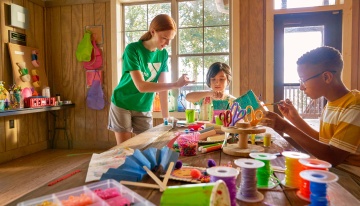Summer Screen Time: How Much is Too Much?
Summertime means more free time for youth. Without the school day to occupy them, many children and teens find themselves entertained by TV, video games, websites and digital devices. While these devices can be comforting on a rainy day or a means of decompressing, many parents, caregivers and camp staff may wonder: How is screen time affecting the health and development of the kids in our lives?

The answer is in the research:
- By the time children turn 10 years old, every additional hour of television they watched as toddlers is associated with lower math and school achievement, reduced physical activity and victimization by classmates in middle childhood (JAMA Pediatrics).
- For every hour of television children watch, they are 8 percent less likely to eat fruit every day, 18 percent more likely to eat candy and 16 percent more likely to eat fast food (Time).
Meeting the needs of human connection and holistic support are key to the healthy development of all youth — and there’s a real concern by many youth development specialists that screen time may be replacing those critical moments in a child’s life.
So, how much summer screen time is too much?
According to the Y’s Healthy Eating and Physical Activity (HEPA) Standards, caregivers should eliminate screen time for children under two years of age. For children over two, screen time should be limited to less than 30 minutes per day for children in half-day programs (four hours) and less than one hour per day for children in full-day programs.
Here are some helpful strategies to help camp staff and families limit screen time with youth:
- Give youth opportunities to create daily reflection “posts” to capture their highlight of each day. These can be done via drawings, writings, etc. Post on a “social media” bulletin board.
- Connect interactive lessons to popular media to engage youth without the screen. Make apps, games and shows come alive through building, sculpting and acting. For example, learn about the culture, community and population depicted in a popular show. Explore commonly eaten foods, popular physical activities, climate and so on. Create a new jingle for favorite TV shows.
- Create screen-free challenges. Start small—for example, no devices during mealtimes. Feeling a bit braver? Start screen-free weeks and use the time to help kids explore new interests outside of media consumption.
- Introduce new clubs or activities that children help plan, lead and organize. Involvement increases personal investment, peer engagement and leadership opportunities.
- Sit down with your child and ask them what their bucket list is for the summer. Some of their requests may be surprisingly simple, such as stargazing at night, going on evening walks after dinner or having a water balloon fight. These simple activities will distract them from spending too much time in front of a screen.
- Definitely restrict screen time before bedtime. Allowing children to watch TV, play video games or be on electronic devices right before bedtime affects the level of melatonin the body produces, resulting in less of the sleep-inducing hormone.




